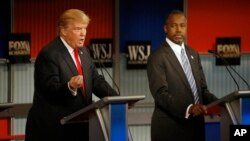The Republican political outsiders have been getting a pass on their limited grasp of foreign policy in the presidential campaign. That may be ending as a result of the terrorist attacks in Paris.
Republicans favored Donald Trump even after he acknowledged not knowing the difference between Hamas and Hezbollah. And they didn't fret over Ben Carson's mistaken belief that the Chinese are involved in the Syrian conflict.
Yet Friday's terrorist rampage in Paris sparked an urgent focus on national security that will test the appeal of the outsiders like nothing they've faced so far. Their lack of governing experience - an asset for much of the year as people rebelled against the establishment - now represents a question mark for Americans suddenly anxious about the nation's security and the prospect of another war.
‘Real crisis situation’
“This is real life, a real crisis situation, and it reminds people of the importance of having a serious person as commander in chief,” said Dan Senor, a foreign policy adviser for 2012 Republican nominee Mitt Romney and unaligned in 2016. “In a race where there are some serious candidates and some less-than-serious candidates, one would think that a distinction would be made.”
Senor declined to name the “less-than-serious” candidates, but the inference was clear.
Trump, a real estate mogul-turned reality television star, and Carson, a retired neurosurgeon, have shaken up the race for the Republican nomination with their surprising rise to top of the polls over establishment favorites including Jeb Bush, the son and brother of former presidents, and Marco Rubio, a young Florida senator. With the first primary contests less than three months away, the Republican field remains volatile while Democrats have increasingly consolidated behind Hillary Clinton.
Trump has talked tough on foreign policy but struggled at times to demonstrate fluency on international issues. Carson is still getting up to speed on the world's many conflicts. When repeatedly pressed in a weekend Fox News interview to name an ally he'd contact to combat the Islamic State group, he said he'd call “all of the Arab states.”
Limited experience
Carson campaign manager Barry Bennett said the campaign was looking to add foreign policy advisers, even before the Paris attack that left at least 129 people dead. Carson had a three-hour lunch last week with former Secretary of State Henry Kissinger, for example.
Bennett says Carson is hardly alone in his lack of foreign policy experience.
“Who has experience on the international stage?” he asked of the 2016 Republican field. “There is nobody. Jeb Bush doesn't have any. Ben Carson's been to more countries than Marco Rubio.”
South Carolina Senator Lindsey Graham, an Air Force veteran, has made national security the primary focus of his campaign, but barely registers in the polls. The rest of the Republican field, however, has limited experience with foreign affairs.
Bush is among a half dozen governors or former governors in the contest who led their states' national guards and sometimes traveled abroad for trade missions. Among the four senators in the race, Rubio and Kentucky Senator Rand Paul often examine complicated international issues as members of the Senate Foreign Relations Committee, while Graham and Texas Senator Ted Cruz focus on military issues on the Senate Armed Services Committee.
Trump wavering, but favorite
Trump has repeatedly refused to answer direct questions about who's been advising him, other than mentioning 79-year-old business magnate Carl Icahn. In August, he suggested he gets foreign policy advice from watching television.
Yet Trump has made an aggressive foreign policy a central part of his platform.
He's long vowed to make the country's military so strong “that nobody will mess with us.” He's also focused on choking off money to Islamic State militants by calling for “bombing the hell out of” the oil fields they control.
Despite skepticism from some establishment Republicans, Trump was among the most trusted Republican candidates on international affairs before the Paris attacks.
A September CNN poll found that 22 percent of Republican and Republican-leaning independents thought he would best handle foreign policy, the most of any candidate.
Now, some of the more experienced candidates are working to promote their foreign policy chops.
Ohio Governor John Kasich, who served on the House Armed Services Committee for nearly two decades while in Congress, is scheduled to outline his national security strategy on Tuesday in Washington. Bush will address U.S. military needs in light of the Paris attacks in an address Wednesday at The Citadel military college in South Carolina.




